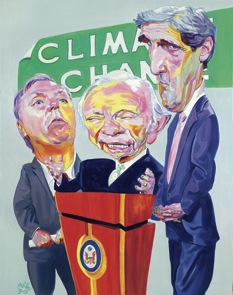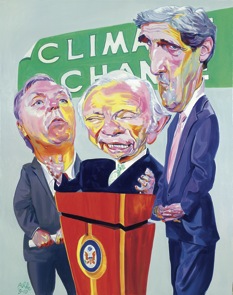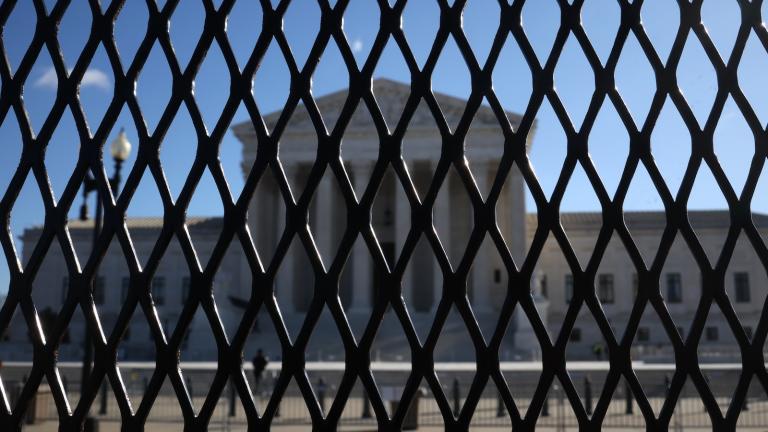As the Senate debate expired this summer, a longtime environmental lobbyist told me that he believed the “real tragedy” surrounding the issue was that Obama understood it profoundly. “I believe Barack Obama understands that fifty years from now no one’s going to know about health care,” the lobbyist said. “Economic historians will know that we had a recession at this time. Everybody is going to be thinking about whether Barack Obama was the James Buchanan of climate change.
It may be true that Obama “profoundly” understands what failing to address global warming means. Certainly I (and many others) thought that was true — until he basically punted on the issue without a serious fight.
 The lengthy New Yorker piece, “As The World Burns,” however, suggests that if Obama did understand the transcendent nature of human-caused climate change, he personally didn’t try bloody hard to put together 60 votes for a bill.
The lengthy New Yorker piece, “As The World Burns,” however, suggests that if Obama did understand the transcendent nature of human-caused climate change, he personally didn’t try bloody hard to put together 60 votes for a bill.
The piece is well worth reading, although the conclusion, quoted above, just misses the mark. I don’t believe that in 50 years “Everybody is going to be thinking about whether Barack Obama was the James Buchanan of climate change.” Let’s set aside whether “everybody” (or even most people) in 2060 (or even today) would know what the “James Buchanan of climate change” means. For the record, Wikipedia notes:
Buchanan had once aspired to a presidency that would rank in history with that of George Washington. However, his inability to impose peace on sharply divided partisans on the brink of the Civil War has led to his consistent ranking by historians as one of the worst Presidents.
While Obama certainly aspired to be a president of the first rank, I doubt he will be ranked by historians as one of the worst presidents. He isn’t in Bush’s league. After all, W actively tried to block all domestic and international action on climate (see “Bush will go down in history as possibly a person who has doomed the planet”) — whereas Obama put real effort into both — for a while.
Obama just didn’t try hard enough or competently enough.
But the White House didn’t merely fail to try hard enough, fail to twist arms with Senate Democrats, fail to become engaged in the process enough to make a workable deal. It did some genuinely incompetent things, as the New Yorker explains:
On March 31st, Obama announced that large portions of U.S. waters in the Gulf of Mexico, the Arctic Ocean, and off the East Coast—from the mid-Atlantic to central Florida—would be newly available for oil and gas drilling. Two days later, he said, “It turns out, by the way, that oil rigs today generally don’t cause spills. They are technologically very advanced. Even during Katrina, the spills didn’t come from the oil rigs, they came from the refineries onshore.” From the outside, it looked as if the Obama Administration were coördinating closely with Democrats in the Senate. Republicans and the oil industry wanted more domestic drilling, and Obama had just given it to them. He seemed to be delivering on the grand bargain that his aides had talked about at the start of the Administration.
But there had been no communication with the senators actually writing the bill, and they felt betrayed. When Graham’s energy staffer learned of the announcement, the night before, he was “apoplectic,” according to a colleague. The group had dispensed with the idea of drilling in ANWR, but it was prepared to open up vast portions of the Gulf and the East Coast. Obama had now given away what the senators were planning to trade.
This was the third time that the White House had blundered. In February, the President’s budget proposal included $54.5 billion in new nuclear loan guarantees. Graham was also trying to use the promise of more loan guarantees to lure Republicans to the bill, but now the White House had simply handed the money over. Later that month, a group of eight moderate Democrats sent the E.P.A. a letter asking the agency to slow down its plans to regulate carbon, and the agency promised to delay any implementation until 2011. Again, that was a promise Kerry, Graham, and Lieberman wanted to negotiate with their colleagues. Obama had served the dessert before the children even promised to eat their spinach. Graham was the only Republican negotiating on the climate bill, and now he had virtually nothing left to take to his Republican colleagues.
Most of the people I know engaged in the day-to-day process of trying to get a climate bill were utterly baffled by the drilling and loan guarantee moves. The New Yorker piece is dead on here. Who is to blame? The piece continues:
But the Administration had grown wary of cutting the kind of deals that the senators needed to pass cap-and-trade. The long and brutal health-care fight had caused a rift in the White House over legislative strategy. One camp, led by Phil Schiliro, Obama’s top congressional liaison, was composed of former congressional aides who argued that Obama needed to insert himself in the legislative process if he was going to pass the ambitious agenda that he had campaigned on. The other group, led by David Axelrod, believed that being closely associated with the messiness of congressional horse-trading was destroying Obama’s reputation.
“We ran as an outsider and then decided to be an insider to get things done,” a senior White House official said. According to the official, Schiliro and the insiders argued, “You’ve got to own Congress,” while Axelrod and the outsiders argued, “Fuck whatever Congress wants, we’re not for them.” The official added, “We probably did lose part of our brand. Obama turned into exactly what we promised ourselves he wasn’t going to be, which is the leader of parliament. We became the majority leader of both houses, and we ceded the Presidency.” Schiliro’s side won the debate over how the White House should approach health care, but in 2010, when the Senate took up cap-and-trade, Axelrod’s side was ascendant. Emanuel, for example, called Reid’s office in March and suggested that the Senate abandon cap-and-trade in favor of a modest bill that would simply require utilities to generate more electricity from clean sources.
Axelrod — what a shock. He may know a lot about running a presidential campaign, but not so much about running a White House, let alone about avoiding either catastrophic global warming or the ruination of his boss’s historical legacy.
The New Yorker piece has much more to say about John Kerry, Joe Lieberman, and Lindsey Graham. It
may well be that there was no route to 60 votes in this political climate even if Obama had been a cross between Lyndon Johnson and Winston Churchill, but there certainly was no route to 60 votes without Obama using all of the political and rhetorical powers of the White House.
Finally, for the sake of completeness and so as not to be misunderstood by those who aren’t regular readers, most of the blame for this failure should go to the anti-science, pro-pollution ideologues. They have spread disinformation and poisoned the debate so that it is no longer even recognizable. Who could have guessed just a couple of years ago, that the GOP champion of climate action would now trash a bill considerably weaker than the one he tried to pass twice?
And if you are keeping score at home in the blame game, the media is the second most culpable group for their generally enabling coverage — see “How the status quo media failed on climate change.”
Those two groups deserve about 90 percent of the blame (60-30?), I think (assuming that we assume the 60 vote antidemocratic super majority requirement is unchangeable). The other 10 percent goes to Obama and his team (along with Senate Democrats, scientists, environmentalists, and progressives) — and let’s not forget the “Think Small” centrists who also helped shrink the political space in the debate.
Obama is neither the James Buchanan of climate change nor the Herbert Hoover of climate change. Not that it matters much, but I’d say right now he’s the President Bill Clinton of climate change.
Is there time to change that? The President still thinks so in his Rolling Stone interview, and I will do a post on that shortly, but for now, I’ll stick with my earlier analysis and say probably not.




